- Home
- Jessie Haas
A Horse like Barney Page 4
A Horse like Barney Read online
Page 4
“So anyway,” Albert said, “this hay’ll be ready tomorrow afternoon, and if you guys want to pick it up in the field, we’ll lend you a truck and give you a deal. You want it?”
“You’d better talk to Mom. She’s coming to pick me up.”
But as Sarah hung up from calling Mom, she realized: Tomorrow afternoon. She was going somewhere with Missy tomorrow afternoon.
Darn it, why now? Why couldn’t they have gotten hay earlier in the summer, when it would have been a release from total boredom?
But there was nothing to be done. In order to get away with the horse search, she was just going to have to juggle all this, and do it cheerfully. Sarah dialed Missy’s number. At least she was at a phone where Mom wouldn’t overhear her.
When Mom arrived, she said, “Jill called awhile ago. I said you’d call back—I didn’t think you’d be so late.”
“We went swimming,” Sarah said. “I’ll call her from here. Mr. Jones wants to talk with you about some hay.”
“I don’t have to watch the kids tomorrow,” Jill said. “Do you want to come over?” Jill always asked that, but in a voice that signaled: Say no!
“Why don’t you come to my house instead? Except—oh, shoot! Sometime in the afternoon I have to help pick up hay, and I have to ride Herky.”
“Oh. Well, I can help hay.”
“No, I have a better idea,” Sarah said. “You ride Herky while I’m haying! Then we’ll have more time together. You want to?”
There was a pause, and Sarah could hear the line humming. Then Jill said, “Yes. Yes, I do want to.”
“Do you want us to pick you up? You’ll sweat to death if you ride your bike.”
“I don’t care. It’ll be nice to be by myself for a while.”
Sarah could understand that. But not even a week of Pete and Fred and Brian and the baby could have driven her to bike so far this summer. Jill was little and wiry, though, and heat didn’t seem to bother her.
“All right,” Sarah said. “See you tomorrow.”
6
Hay
They had never said what time Jill was to arrive, and Sarah expected a long, irritating wait. But it was early when the phone rang.
“I can’t come,” Jill said flatly. “Pete took my bike yesterday and bent the frame.”
“Can’t your mother bring you?”
“She took Pete and Fred swimming.”
Jill didn’t used to finish sentences. She would rattle on, leaving no space for replies. Now there was too much space, and each sentence ended in a definite period. It made talking with her much harder. But anger carried Sarah forward in a splendid rush.
“We’re coming to get you!”
“I don’t know. I think Dad might want to go out—”
“You get out first! Get out now. Disappear!”
“I don’t—”
“Do it, Jill. Start walking. We’ll pick you up.”
“Um—” There was a surge of background TV noise, loud voices. Jill gave a sudden, nervous giggle. “Okay. See you!”
Mom was busy gardening. Boldly Sarah rapped on the door of Dad’s study and walked in.
He was on his feet, wandering restlessly around the room. The look he bent on Sarah was hot and irritated.
“Want to go for a ride?” Sarah asked quickly. Dad’s eyes brightened for a moment. When he couldn’t think, nothing helped his mind get moving again like a nice drive in the car.
Then he frowned. “No. Haven’t you ever heard of acid rain, Sarah? Haven’t you heard of global warming?”
Sarah pressed her lips firmly together. The point here was not to have a fight with Dad or show off how much she already knew about environmental problems.
“Jill’s bike is broken. We have to pick her up.”
“Oh!” Dad brightened again. “Good. But no talking. Okay?”
Dad drove with perfect competence, and it took a very knowledgeable eye to see that his mind was elsewhere. Sarah only realized how far elsewhere he was when a half mile from Jill’s house they rounded a bend and she saw a small, hot figure trudging up the road. Dad hurtled past, oblivious.
“Dad!”
“No talking.”
“But stop! There’s Jill!”
“Where? I thought we were going to her house.”
“She’s walking to meet us!”
“I don’t see her.” He had slowed, and now he came nearly to a stop, looking in the rearview mirror. A large cattle truck came around the corner, rattling loudly. Dad gunned the engine and continued down the road, looking for a place to turn. The first place he came to was Jill’s driveway.
Struggling to keep her temper, Sarah stared out the window at Jill’s crowded front yard: baying hounds on top of their doghouses, a swing set, a tree house, three junk cars, a penful of goats, and a gigantic satellite dish. Beneath the noise of the hounds she could hear yelling in the backyard. It seemed hotter here than at other places, and stickier.
They turned around, and this time Sarah kept careful watch. Jill was leaning on a guard post with her face turned toward them. She was flushed, and Sarah couldn’t tell if it was from heat or from trying not to cry. “Sorry,” she whispered as Jill got into the backseat, and she made secret, insulting hand gestures at Dad until Jill could hardly keep from giggling.
Once they were home and could talk, though, things suddenly seemed more difficult. Until Jill asked, Sarah didn’t feel that she should tell her news. She was already so much luckier that it seemed as if Jill should at least have the chance to talk first. But Jill was unusually silent.
“Let’s take Star and Goldy down to the brook,” Sarah suggested when they’d sat in front of the living-room fan for a few minutes. There was no swim to look forward to today, but the brook, though shallow, was always cold.
Goldy found even getting her hooves wet a horrifying experience, but Sarah, Jill, and Star submerged as much of themselves as possible, and finally Jill seemed ready to talk. “What horses have you seen?” she asked, and Sarah was able to tell her about Beau and MaryAnne, Handsome Hank, and the Morgan show.
“So is there one you like best yet?” Jill asked.
“Beau,” said Sarah. “He’s the one.”
“But can you train him all by yourself?”
“I think so,” said Sarah boldly. In her dreams she had already trained him to perfection. “Or we could send him to a professional.”
“Oh, that would work.”
“Anyway,” Sarah said, “we’ll keep on looking. Do you think you could come sometimes? It’s really fun.”
“No,” Jill said. “I don’t think so.”
Early in the afternoon Albert called to say they were starting to bale. Everyone piled in the car and rode over to Jones Dairy, and while Mom, Dad, and Sarah wrestled with massive bales—“Can’t you make these things smaller, Albert?”—Jill took Herky on his six-mile trot.
It took Sarah less than fifteen minutes in the hayfield to reach total exhaustion. Her back ached, and her arms were red and prickly from the rough edges of the bales. By then the truck was only one-third full. Now Sarah understood where Albert’s energy had gone all summer—and where his fatness had gone, too. No wonder he barely had the strength for speech!
She spurred herself on by thinking of the horse all this was for. The image kept flipping back and forth between Barney and Beau, and neither of them seemed anywhere near grateful enough.
When they returned the truck, after packing all their hay into the barn, Jill was back, cooling Herky down. She groaned when she saw Sarah. “I won’t be able to walk tomorrow!”
“Me either,” Sarah said, rubbing the small of her back.
Albert passed them, barely visible in the gathering dusk as he took a wheelbarrowful of fresh sawdust to the calf pen. “You’ll be able to walk,” he said. “You may not enjoy it!”
“Albert, how can you do this every day?” Sarah asked. “Doesn’t haying just make you want to cry?”
Albert paused
. After a moment Sarah saw him shrug. “It’s only three or four months—”
“Yeah, the whole summer!”
“It makes school seem very relaxing,” said Albert, and continued on his way.
After supper Jill and Sarah went upstairs, to wait until Mom was ready to take Jill home.
Jill flopped down across Sarah’s bed. “I had such a good day! It was great to go riding!”
“I wish you lived closer,” Sarah said. “You could do it a lot more.”
Jill said, “No, I probably couldn’t.” She turned so Sarah couldn’t see her face. “I’d still have to baby-sit.”
Hesitantly Sarah asked, “Do you think your parents would ever let you have a horse?”
Jill shook her head.
“Too much money?”
“I wouldn’t want a horse of my own,” Jill said quietly. “It’d be just like the bike. Pete and Fred would ruin him.”
“Oh.” Sarah had never thought of that. “I’d like to kill Pete!”
At that Jill laughed and turned her face to Sarah. “Someday I’m going to,” she said. “I’ll let you help!”
7
The Log
The next two weeks were simpler to organize, and they were wonderful. After Sarah finished her housekeeping every morning, she drew pictures of Beau. She never quite caught the elegant plainness of his head, but she kept trying. In the early afternoon Missy arrived in Old Paint, and they headed off together.
They looked at a spavined Arabian and a retired Standardbred racer that didn’t know how to canter. They went to a Morgan farm and were shown two fat mares and a gelding with a narrow chest, described by the boy handling him as “a real old type.” The boy wore a white shirt and pale cream pants with never a smudge on them. Sarah could just imagine him bobbing around a ring on one of the carousel horses.
They went to another Morgan farm, where the owner claimed to be the only person left on earth breeding old-type Morgans. His horses looked completely different from MaryAnne’s, and when Missy mentioned her name, the owner had never heard of her.
Each time they approached a horse, Sarah felt uneasy, and each time the feeling went away in moments. No, she was not going to fall in love again. No, she did not like this horse better than Beau.
She didn’t mention this inner yardstick to Missy. Missy took a fresh look at each horse. She could tell where it might take Sarah and what it would fail at. Sarah listened with interest. Someday she’d want to know how to make these assessments, someday when she was getting another horse. Right now her choice was already made.
Between appointments they cruised the little back roads, and whenever they saw horses in a roadside pasture, Missy slowed down to fifteen miles per hour. If they saw a lake or a swimming hole, they stopped. At the end of the day there was a rush to get Sarah back in time to ride Herky before dark.
Mom and Dad seemed only dimly aware, at first, that Sarah’s life had changed. She was always careful to tell Dad when she was leaving. “Going swimming with Missy,” she’d say, and he’d look up vaguely from his work and nod and sometimes say, “You’re lucky!”
She left a note for Mom, too—an all-purpose note that she never bothered to rewrite because it always said the same thing. “Swimming with Missy and riding Herk. Back before dark. Love, Sarah.”
“What about Jill?” Mom asked on the second Saturday morning. “You don’t seem to see much of her.”
“She’s baby-sitting.”
“Even on weekends?” Mom looked disapproving.
“Her mother’s trying to work as much as she can this summer, while she has Jill to look after the kids.”
“I can understand if they need money,” Mom said, “but it isn’t fair to Jill. I think you should try to spend more time with her, Sarah.”
Sarah felt herself flush, and something hurt deep in her chest. It isn’t that easy! she wanted to shout.
“Here’s Missy,” she said as Old Paint rattled into the yard. “We’re going swimming.”
“Again? Doesn’t Missy have friends her own age?”
Sarah went out the screen door just in time to keep from snapping at Mom. She grabbed her suit and towel from the clothesline, while Old Paint’s radio blared the discouraging weather forecast—hot and hazy, high in the nineties—then swung into a Beach Boys song. It would be impossible to explain how easy it was to be with Missy. Horse hunting completely erased the age difference. Being friends with Missy was the next best thing to being grownup herself.
They looked at a Thoroughbred off the racetrack and were heading home when they passed the Equestrian Center, a complex of stables, rings, and rolling green fields where all kinds of horse shows were held. The parking lot was crowded with trailers, and there were horses everywhere.
There was no need to consult. Missy parked beside the road, and they got out and headed for the action.
They came first to an arena where a dozen riders were warming up, cantering their horses in circles and popping over a couple of practice jumps. The horses were giants, angular, fine-boned skyscraper horses.
But among these fantastic creatures Sarah saw a little horse that could only be a Morgan. While the tall beauties swept past in their slow, long-legged cadences, Sarah’s eyes found him again and again.
In this company he looked like a pony. The man in the saddle seemed too heavy for him, and Sarah could almost feel the effort the little horse had to make, powering the two of them over the Thoroughbred-sized jumps. But his ears stayed forward, and his whole expression was perky and cheerful.
“He looks like Barney,” Sarah said.
“Do you think this guy knows what he’s getting himself into?” Missy asked.
“He sure doesn’t look it!” Sarah watched the heavy man thump back onto the saddle after a jump. “Anyway, what is he getting himself into?”
“It’s called Combined Training. They do cross-country jumping, show-ring jumping, and dressage, all on the same horse, and they get judged on all three.” Missy was moving toward the spot where the horses started.
A man with a watch and a flag was sending them off, one at a time. One started as Sarah and Missy approached, cantering in small circles until the signal was given, then surging away. It disappeared below a dip in the land, into some trees. There was a splash, quiet, and then the horse reappeared in another part of the field, headed for a jump. Over it went, so far away that the act looked effortless, inevitable.
Sarah and Missy climbed the hill, to where a group of people had gathered.
Now they could see the brook the horse had jumped into. Just beyond it, where the land began to rise again, was a huge log, like a telephone pole, set solidly on posts. Far across the fields the other jumps—some brightly painted, others landscaped with shrubs and flowers—looked like part of a game. But the log was serious.
Now more hoofbeats, splash, and grunt. “Good bo-oy!” An earnest-looking bay, with an even more earnest-looking rider. “Good bo-oy!” she cried again as the horse cleared the log. Away they went, the cries echoing back. Part of the course disappeared into trees, but Sarah could trace it, and count the number of jumps, by the earnest rider’s voice. “Good bo-oy!”
Another rider, and another. The successes became a lulling rhythm of hoofbeats, splashing, the silence in midair, hoofbeats again. Sarah’s mind began to wander. Beau wouldn’t look out of place here, she was thinking. Tall and lean and elegant …
Suddenly the crowd around Sarah seemed to tense. A gray horse galloped down the slope. Others had come straight, but this horse wavered, and at the edge of the brook he dug in his toes and stopped. Smack! The whip came down. The horse snorted, plunged through the water, and kept on running. He didn’t seem to see the log until too late. Then he arched himself desperately over it. His front end cleared, but as he descended, his hind legs cracked down on the huge pole, and he pitched to his knees. The rider rolled neatly over his shoulder, landing on her feet with the reins in her hand. The horse scrambled up.
>
There was an indrawn hiss of breath from the crowd and a buzz of murmur as the gray horse walked in a nervous circle, twitching one hind foot high. And then the crowd gasped again. The horse’s leg was bright with blood, glistening in the sunshine.
“Damn!” the rider said, sounding more angry than concerned. Someone ran downhill toward her with a rolled-up bandage, but she waved him away and led the bleeding horse back toward the barns.
Meanwhile, another horse was approaching. Sarah saw with sinking heart that it was the little Morgan.
Despite the size and clumsiness of his rider, the Morgan seemed cheerful. He thundered toward the brook with his ears pricked, already sizing up the log. A sheet of water flew. Missy’s fingernails suddenly dug into Sarah’s arm. In that brief instant, with the log framed in front of the oncoming horse, it became clear how huge it really was and how much smaller he was than the other horses.
Then—snort and spring, ears still gaily pricked—he was over! The rider slid up toward his head and then thumped back onto the saddle. A cheer went up, mixed with disapproving hisses. The little horse thundered on, looking eagerly toward the next jump.
Until that moment Sarah had hated the Morgan’s rider: for putting his horse through this, for pounding back on the saddle like that every time, for having such a wonderful horse when he obviously didn’t deserve one. But as he went by, she saw his astonished, exhilarated face and realized he was terrified. He knew he was no good. But he was doing this, and he was proud and amazed at his little horse. They took the next jump, horse explosive, rider awkward, and Sarah cheered them both.
“Phew!” said Missy. “That’s enough for me!”
“Me, too,” Sarah said. She was actually a little shaky.
“For about ten minutes there,” Missy said as they started back across the field, “I was planning to do that with Barney next summer.”
“You should,” Sarah said. “He’d love it.”
“He would, wouldn’t he? I wonder if I would.”
Sarah didn’t have to wonder. Over and over she was taking the log—not on the gray horse, which had crashed, and not on any of the others, which had soared over so easily. She was on the little Morgan, wondering if she was going to survive, feeling the horse’s cheer and confidence. She had an airy sensation in her chest, like flying, or like singing.

 Chase
Chase The Sixth Sense
The Sixth Sense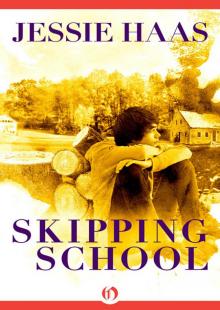 Skipping School
Skipping School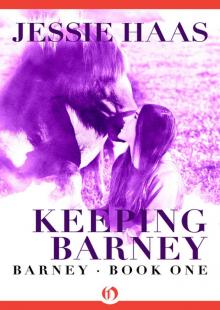 Keeping Barney
Keeping Barney Unbroken
Unbroken Westminster West
Westminster West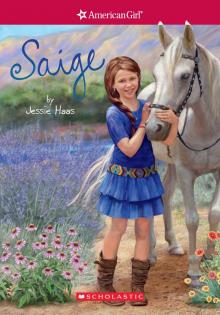 Saige
Saige Beware the Mare
Beware the Mare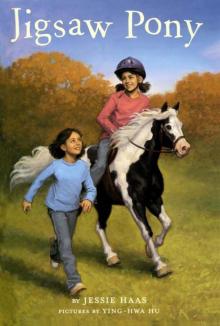 Jigsaw Pony
Jigsaw Pony Rescue
Rescue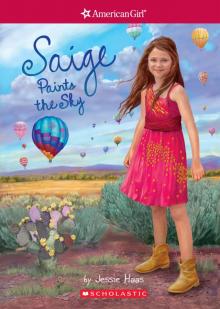 Saige Paints the Sky
Saige Paints the Sky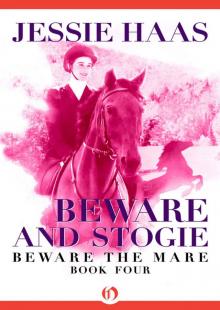 Beware and Stogie
Beware and Stogie Chico's Challenge
Chico's Challenge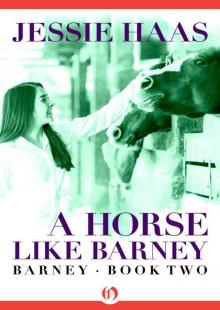 A Horse like Barney
A Horse like Barney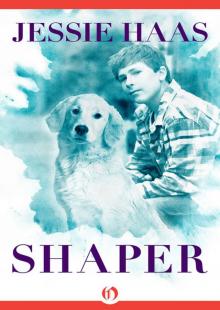 Shaper
Shaper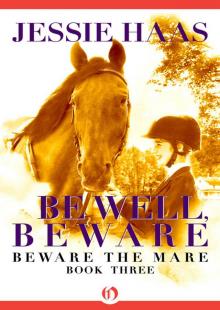 Be Well, Beware
Be Well, Beware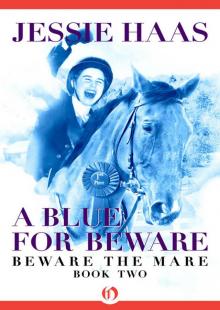 A Blue for Beware
A Blue for Beware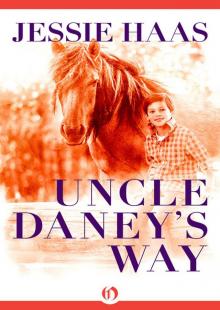 Uncle Daney's Way
Uncle Daney's Way